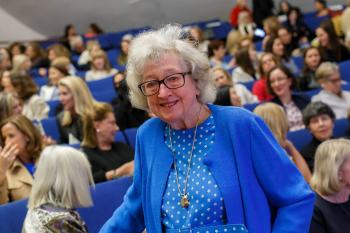
Mourning the Loss of a Great Addiction Pioneer
Nora D. Volkow, Director, NIDA, and George Koob, Director, NIAAA

We are profoundly saddened at the passing of Dr. Mary Jeanne Kreek last week, at age 84. A longtime NIH grantee, Mary Jeanne contributed enormously to the study of addiction, and her work has been crucial in eroding the stigma that still surrounds this disease and its treatment. She also served as a towering role model for women in science, busily breaking glass ceilings (as she put it in this oral history interview) through her tireless scientific work and leadership.
Although she made many contributions to our science, Mary Jeanne is best known for her work developing the first medication for opioid use disorder, methadone. During her medical residency in 1964, she joined the laboratory of Vincent Dole at The Rockefeller Institute for Medical Research, which was studying the neurobiology of heroin addiction with an aim to develop a medication to treat it. They identified methadone—a long-acting oral opioid analgesic—as potentially able to quell the cravings felt by patients without producing the destructive intense highs and lows produced by heroin, which both enters and leaves the brain much more quickly.
Mary Jeanne’s research led to the first methods to measure methadone concentration in the body, which facilitated the studies that led to methadone’s approval by the FDA for treating heroin addiction in 1973. Methadone remains the most widely used medication for opioid disorder all over the world. Her research later contributed to the development of the second medication for opioid use disorder, buprenorphine—currently the most prescribed in the U.S.
It was Mary Jeanne’s work in the early 1980s that first identified injection drug use as the second major risk behavior for HIV transmission, after unprotected sex. And in her lab at The Rockefeller University, she also went on to study the genetic underpinnings of opioid, alcohol, and cocaine addiction, identifying numerous gene variants making certain individuals more vulnerable. She was actively doing research until her death. Among her many awards and honors during her illustrious career, NIDA honored Mary Jeanne with a Lifetime Science Award in 2014.
My (George) favorite memory of Mary Jeanne was watching the deftness with which she used science to inform policy in the addiction field. It made a lasting impression on me that one could translate basic research to helping others, and I have made that a guiding framework of my career.
I (Nora) have many fond memories of Mary Jeanne, but one particularly sticks with me. She had a deep love for her family and was very proud of both her children and her grandchildren. She once showed me a picture of her granddaughter, and I was struck that the spark glittering in the eyes of the curious child in the photo was identical to the spark in Mary Jeanne’s eyes whenever she spoke about science, or her own research. Mary Jeanne had the wonder and the joy of a child, while possessing an impeccable intelligence, vast knowledge, and a humanity that will stay with us. ;
Need Help for an Alcohol Problem?
If you’re having an emergency, call 911. If you are having suicidal thoughts, call 911, go to the nearest emergency room or call the toll-free, 24-hour National Suicide Prevention Lifeline at 1-800-273-TALK (8255) to help you through this difficult time.
The NIAAA Alcohol Treatment Navigator can help you recognize and find high quality treatment for alcohol use disorder. If you drink excessively, seek medical help to plan a safe recovery as sudden abstinence can be life threatening. NIAAA’s Rethinking Drinking can help you assess your drinking habits and provides information to help you cut back or stop drinking.







